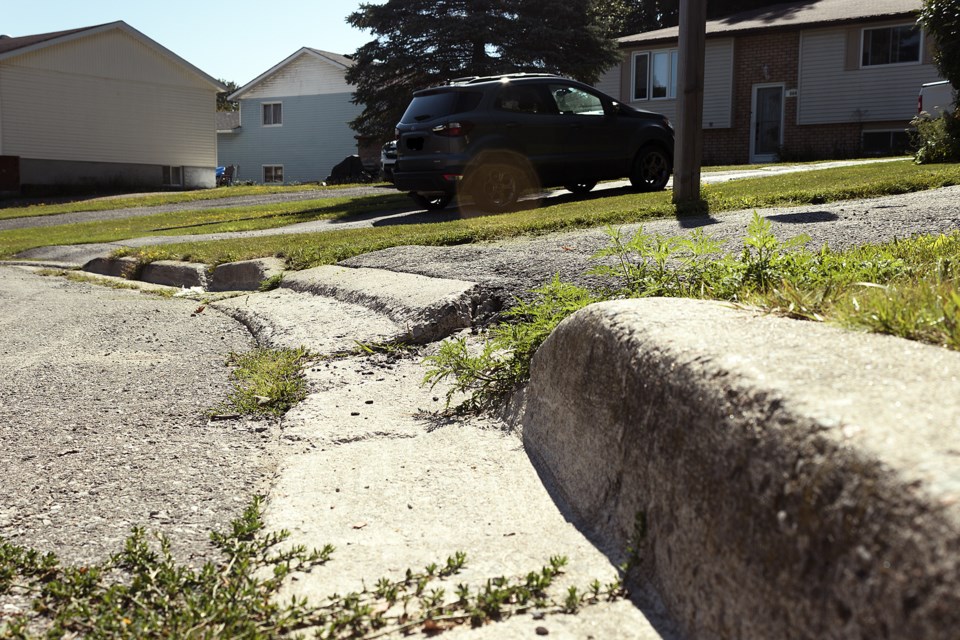Balance can sometimes be a hard thing to obtain, and harder to recover if lost.
MidlandToday reader Dennis Bressette raised awareness of an injury he sustained in July while helping to move his mother-in-law’s belongings at her Willowcourt Drive residence.
“The curbs have been heaved considerably at the edge of these driveways for about seven or eight houses there,” said Bressette by phone.
“I set the (leaf) bag down, and just because of the unevenness of that cement curb, I tripped and fell – smacked, broke my glasses, hurt my shoulder, my hip – out onto the road, actually.”
Bressette filed an accident report with the town and sent photos of the conditions where he tripped.
In an exchange obtained by MidlandToday, the town’s legal department informed Bressette that “pursuant to our Entrance By-Law, 99-176, it is the sole responsibility of the property owner to maintain the entrance of the property”, and in that regard the municipality “is of the view that there is no responsibility or liability on its part in respect of the reported incident”.
As Bressette was providing a service to the homeowner, section 3 of the Occupier’s Liability Act states that the homeowner has a duty “to ensure the safety of all persons entering onto their property”.
Furthermore, the legal department suggested that if Bressette were seeking compensation, then he should take up action either with WSIB or with the resident homeowner responsible for the driveway – which in this case would be his mother-in-law.
“Absolutely not,” replied Bressette when asked if he would sue his mother-in-law.
“All I really want to have happen is for them (the municipality) to fix all the driveways of all the people there. (The conditions:) They’re terrible. Very, very bad. And it’s the town property.”
Executive director of environment and infrastructure Andy Campbell couldn’t speak to any claims put forward to the town, nor directly to the incident regarding Bressette. MidlandToday was able to inquire about curbs and road maintenance.
“Curbs typically get fixed when the asphalt gets replaced. Typically in a subdivision, asphalt will last 25 years,” said Campbell.
According to Campbell, costly road infrastructure is scheduled years in advance, anticipating what needs to be prioritized through the sciences involved with municipal trucks driving each street and scanning with radar, sonar and lidar. A roads needs assessment is compiled every five years from that data, showing the deficiencies for each street in town; the last such report was provided within the 2019 Multi-Modal Transportation Master Plan which refers to Willowbrook Court in the 7.4.1 Pedestrian Network section.
The main problem the town faces in road infrastructure is the obvious one: funding.
“This year, we’ll get $600,000 in government grants towards our roads – and we fully spend that on roads – but that’s not enough,” Campbell explained.
When the 70-year-old clay sewer pipes beneath Seventh Street collapsed a few years ago, it took until 2021 for council to approve the emergency $2.4 million for this year’s complete street repair.
“We try to do one street per year. It’s all we can afford because typically it’s about $1- to $2-million for a block to do. We just don’t have the resources to fix everything. I wish we did, but we just don’t.
“The only way we fund things is government grants and taxation; there is no other magic money anywhere.”
Campbell explained that fixing sidewalks can cost between $200,000 to $300,000. Midland had received ample growth in the 1970s, and for the lifespan of underground pipes averaging 70-to-80 years, playing catch-up with road repairs is the priority. Sidewalks with a 25-year lifespan have already exceeded their longevity, but capital budgeting prioritizes the most severe repair needs.
Within Simcoe County, Midland had consistently received the lowest annual funding from the Ontario Municipal Partnership Fund at approximately $2.7 million over ten years, in comparison to over $9 million for other municipalities; in 2022 Midland received $620,000 in funding.
Paid parking is the primary means for the municipality to generate revenue; in July, residents urged council to remove paid parking at a projected loss of $500,000 in revenue.
“The money to replace it (sidewalks) comes through property tax in general, and residents need to realize they need to invest in the infrastructure in town because it doesn’t last forever,” Campbell stated.
“I say to people: ‘Do you want your sidewalk, curb, or road fixed?’ They’ll say: ‘Yes, I do.’
“I’ll ask: ‘Do you want your property tax to go up?’ They reply: ‘No.’ Then we’ve got a problem.
“Somehow we have to find a balance; that balance means that a little bit every year gets fixed.”
Campbell added that having residents participate directly in the public input meetings for the annual budget process is one means for voices to be heard, and possibly, become lobbied to have their concerns elevated on the priority list for their area.



